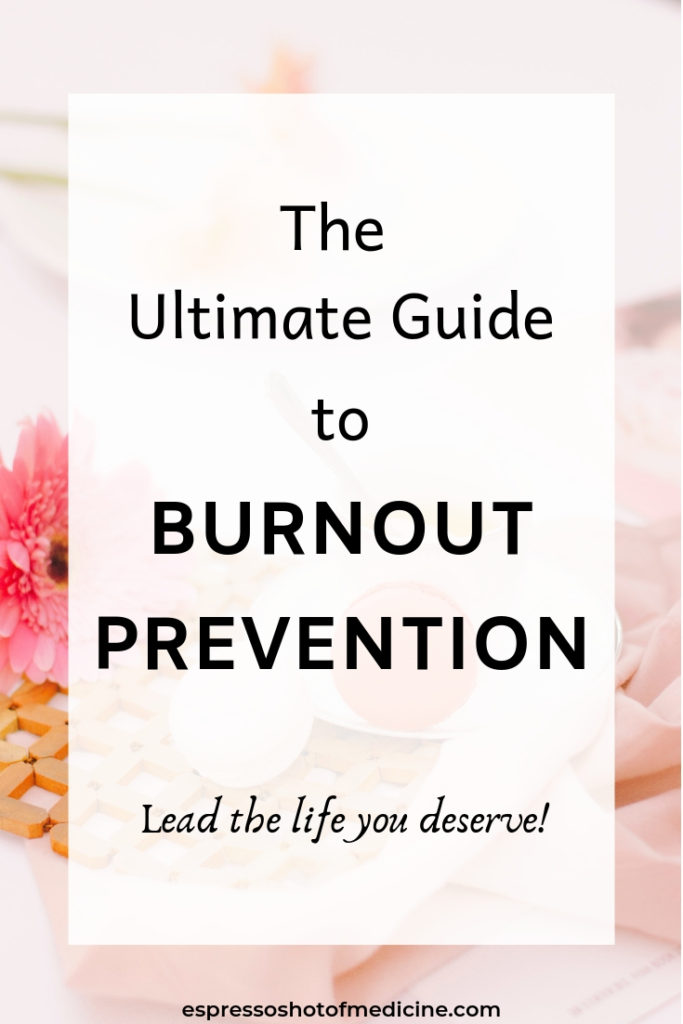
Many of us were raised to have a work, work, work mindset.
I always thought that if I just pushed through a little bit more, if I was just just a little bit more disciplined, if I could just get my time management skills in order, I could continue working, I could continue functioning at 100%.
Instead, I experienced repetitive bouts of burnout during which I would basically check out of life. I would sit in my room binge-watching shows for a week or so until I slowly started to recover.

I judged myself each time this happened. Each time it was over, I worked even harder to make up for the lost time and to prove to myself that I wasn’t weak. Sound familiar?
It took until my 25th birthday after numerous bouts of burnout for me to forgive myself for not being some sort of unstoppable terminator.
So in the words of Arnold Schwarzenegger, I looked at my work and said, “I’ll be back.”
I realized that my old method of working crazy hard and then burning out really wasn’t working.
Instead, I was ruining my health. Something needed to change.
I decided to look into the medical and psychological research on burnout and mental health to learn how to prevent burnout.
This article is the result of all my research.
Related articles:
- The Bold Way Burnout is Destroying Your Self-Confidence
- Burnout Prevention Journal for the Busy Professional
- How to Overcome Fear of Failure and Develop Grit
It is all the research in medicine and psychology that I found useful compiled into the ultimate guide to burnout prevention.
It has greatly helped me! I still get tired and exhausted. But I don’t get to burnout. I don’t have to sit on my couch and binge-watch murder mysteries until I feel better. I’ve learned to identify when I am stressed and have ways to deal with it that will help me recharge and prevent burnout.
I hope you enjoy this ultimate guide to burnout prevention and find it as helpful as I have!
Table of Contents
Let’s start with: what is burnout?
Burnout is a psychological syndrome of exhaustion, cynicism, and inefficacy. It is experienced in response to chronic job stressors¹ when a person does not have the coping strategies to protect oneself from these stressors.
Well that was a mouthful!
What it really means though, is that burnout is when are exhausted, cynical, and unable to work.
It happens because for a while you have been experiencing various stressors in your life without any way of coping with them. Makes sense?
So how do you prevent burnout?
Below you’ll find many ways of dealing with stress. These coping mechanisms can help you prevent burnout.
Will all of them work for you? Absolutely not.
Everybody is different and what works for one person, might not work for you. For that reason, it really does take time to figure out what is best for you.
I understand that might be frustrating. But real change takes time. It takes patience, and it takes a little bit of determination.
While Google might be able to spit out a bunch out websites in seconds, your mental well-being and burnout prevention take time. But I promise it is so worth it in the end!
Therefore, of the following suggestions, see which ones make you excited to try and then give them a whirl.
Most importantly, see which ones you enjoy. There is no point in meditating for example, with the hope of having it calm you down if you hate every moment of it. Stick with the ones you have fun with. Track which ones improve your mood, your energy levels, and ultimately which ones make chronic stress seem just a little bit more manageable.
I’ve also added a Burnout Prevention Journal for the Busy Professional. It’s a great guided journal based on the principles found in this ultimate guide to burnout prevention. It will give you the insights and coping mechanisms that you are need to prevent burnout and live anxiety free!
Related posts:
- Overcome Fear of Failure and Develop Grit
- How Perfectionism Makes Me Procrastinate
- Burnout Prevention Journal for the Busy Professional
Burnout Prevention Mechanisms: The Ultimate Guide to Burnout Prevention
1. Realistic Expectations²
Let’s start off with the beginning of a job/project/role/situation.
Often, at the beginning, our expectations are high. We want to show that we are competent, that we can work hard and are dedicated. Essentially, we want to do well and be superstars.
Sometimes, when things don’t go the way we planned, we are disappointed. However, because we still want to make a go of things, we decide to keep pushing and keep working hard hoping things will change. The result is possible burnout.
So before moving forward, take a moment to ask yourself whether the expectations that you have are realistic.
If you don’t know what your expectations are, take the time now to decide. Without knowing what you want, there is no way you can move forward. You are essentially like a ship without a course.
Questions to ask
What are my goals in working here/doing this?
Is it realistic/achievable?
If so, what can I do to get closer?
If not, what next goal that is realistic would make me happy if I can’t achieve the first one?
Are these goals in line with my values? (If you are not sure what your values are, take some time to think about them and write them down. Once we know what our values are, making goals becomes a lot easier)
When we take the time to step back and rationally look at the facts, we can begin to see how things really stand and begin to come up with a plan for how to deal with what is stressing out out.
Simply even by thinking about the above questions, you can get a more realistic idea of what is stressing you out and why.
2. Understanding Success and Failure²
In some workplaces, people feel inconsequential – you might feel that whatever you do, nothing changes and whether you show up to work or not makes no difference. Over time, these feelings of helplessness when combined with a desire to be helpful and useful can lead to burnout.
Things that can help fight these feelings include asking ourselves key questions.
Questions to ask
Is there a goal I can accomplish that will make me feel that I have succeeded at something?
If I did fail at something, what were the specific causes of that failure, and what can I do to prevent such an event in the future?
Can I control this situation?
If not, what can I do to move past the frustration I feel?
What have I done well this past week? How has that made a difference?
By answering these questions regularly a our role at our job can take on new meaning. This feeling of meaningfulness can prevent the helplessness felt in burnout.
3. Detached Concern²
Many of the, so called, “helping professions” for which empathy is a key component, carry with them high burnout rates. These professions include teachers, counselors, doctors, nurses, just to name a few.
However, it is not just helping professions that experience this problem. Any profession where you are overly identifying with the problems of others or the problems of the company/situation can be draining.
Empathy involves imagining the difficult experience someone is going through. It can be emotionally draining.
Empathy can be very a great tool when we are trying to help someone. However, detached concern allows you to have a sort of shield to the emotions that person is facing themselves. It means that while you understand what the person is going through and feel for them, you don’t allow it to drain you. You understand that it is not your problem.
Detached concern is not something that can be developed overnight.
It takes time to learn how to empathize without it taking over – how to do detached concern.
There are questions that will allow you to differentiate between the type of empathy that is helpful and that which is not.
Questions to ask
Am I helping this individual by overidentifying with their problems?
Is there anything more I can do to help this individual?
How can I step away from the emotions that this person is experiencing?
Am I still showing the kind of empathy and concern that will help this person?
Is there somebody to whom I can turn for help and mentorship with this issue?
4. Change work patterns³
Many people who burn out will find that they work long hours, work hard, and push themselves even when they feel they need a break. While all this may make you feel like a star employee, it is not helping your health, and it may be leading to a clear path to burnout.
Therefore, if you find that you are stretched beyond your limits, consider negotiating for less hours per week of work. I bet you’re thinking, yeah right, you don’t know my boss.”
You’re right, I don’t. And I know that unfortunately many employers will not agree to less hours per week of work. The job has to get done! Right?!
Well I do understand that.
I do also understand that your health comes first, and that you don’t have to stay late every day. So on the days that you see that you are going to stay late, ask yourself:
Will these extra 2, 3 hours of work be productive?
Will I actually get anything done?
If not, well you have your answer. Additionally, even if you will be productive, ask yourself:
How much, if at all, will it affect your mental wellbeing?
How much do you really need to have a break and go home?
I know this isn’t an option for everybody. I know that many of you have a family at home who is relying on you. And even the option of losing your job is out of the question.
I do ask you then, how much are you doing for your family, if you are burnt out, if you can’t move, if you are totally drained and unable to function any longer? Even leaving 20 minutes earlier can be beneficial as it can give us the me-time needed to recharge!
Everyone will have different answers to the above questions and that is okay. Everyone has different limits and I understand that everyone must do what they have to do and I respect that.
If working less is not an option, taking regular breaks at work can help prevent burnout. Taking even short ten minute breaks to step away from your workplace and unwind can greatly help.
The point that must be made however, is that taking a break and scrolling through Instagram, however fun, might not be the best way to unwind. Taking a break to do something we love, something that will give our brains a chance to recover from the work we have been doing is much more important.
Additionally, take a day where you time everything that you do from the moment you come to work until you leave. At the end of the day, look at this log that you created.
Where do you waste time?
Where did you spend time doing something that took much mental effort, but nothing really came out of it?
Once we are clear about where we spend our time, we can begin to make changes that are more in line with the goals you have for your job. This is essentially time management.
Once we notice where time is being wasted, we can find ways to change this.
5. Utilizing Social Resources³
Humans are social creatures. There has been extensive research that shows the benefits of seeking social support in times of stress and how this act can decrease the chances of developing burnout.
This social support can be in the form of professional help from a trained psychologist.
However, it can also include talking to someone who is going through the same or similar situation.
Guidance and support from supervisors can also help as it can outline job expectations more clearly.
Finally, support from friends and family is so importance. It has been shown that sharing or venting of emotions reduces tension and can clarify sources of frustration or distress.
Of course, this isn’t to say that we should whine about all of our problems. Instead, having a trusted friend or family member with whom we can share our problems and stresses can decrease the stress felt at that moment. More importantly, it can prevent burnout from developing in the long term.
The benefits of utilizing your social resources include:
- emotional comfort
- new insights
- personal recognition
- reduced social isolation
- sources of humour, optimism, and encouragement
6. Development of a relaxed lifestyle³
Much of the information online focuses on this section. I typed in “preventing burnout” on my search engine and got a slew of information about bubble baths, yoga, massages, essential oils, and many others.
While these can be helpful, our stress won’t go away with one bubble bath. No matter how amazing they are. These relaxation techniques are more like extras.
They’re only mildly going to help unless you are clear on your goals, expectations, and have fixed your work patterns.
Also, everyone is different. What works for one person in decreasing stress doesn’t necessarily work for another person. Further, if you don’t enjoy some of the relaxation techniques mentioned here, they are not going to work for you.
If you really don’t like bubble baths and are taking one only because it promises to relax you and then spend every moment of it thinking how you can’t wait to shower and get all those bubbles off of you, you really didn’t accomplish anything.
I recently read a great article in Self Magazine. It explained that when it comes to relaxation techniques, it is important to do something that you enjoy, something that makes you happy and thus relaxed while doing it.
For example, I combine yoga, meditation, long walks, and journaling to help me destress and unwind.
The reason I have a few go-to relaxation techniques is because sometimes I’m so stressed out that there is no way I can sit quietly and meditate. So in these cases I will go for a long brisk walk or get all my thoughts out onto my journal. Other times, I want to build up my resilience and sweat out all my troubles and so, I do yoga on my living room floor.
With regards to meditation, I use and highly recommend the Simple Habit app which can be found in the Google App Store. It has lots of free session that I have found incredibly useful!
This is a list of other possible relaxation techniques:
- Yoga
- Reading
- Bubble baths
- Massages
- Meditation
- Deep breathing
- Joyful hobby
- Journaling
- Painting
- Arts and crafts
- Mindfulness practices
- Reflective thinking or writing
- Muscle relaxation training
- Essential oils
- Anything else that makes you happy and takes your mind fully of work and what is stressing you out

7. Realistic Positive Thinking
I think positive thinking has gotten a bit of scrutiny over the last couple of years because it has been transformed into the idea that simply by sitting and thinking positively all our problems will be solved.
That is why I have said realistic positive thinking.
Research has shown that for every one negative emotion, you need three positive emotions to increase resilience and happiness⁴ . Therefore, the importance of positive thinking cannot be undervalued.
Increased positive emotions builds resilience, creativity, and the ability to be solution focused. The development of these skills all prevents burnout!
How do you increase positive thoughts?
The main thing that has been incredibly helpful to me is asking, “Is it true?”
Sometimes we think: “Ugh, my life is so dull.” “I’m so boring.” “I’m such a failure.” “I’ll never succeed in doing that thing.”
But then ask yourself, “Is it true?” Almost, all of the time, the answer is…no.
Once we realize that those thoughts we have are not true, we can start substiting them with positive thoughts.
“Maybe I’m not where I want to be in life right now, but I can start working on that by doing _____.”
“Look at all that I have accomplished up until now. So I certainly can’t be a failure. There are more things that I want to do, and I can start by _____.”
“Maybe my goal does seem really difficult, but there is not reason to think I cannot succeed. I can start by ______.”
8. Sleep, Exercise, and a Healthy Diet³
I’ve grouped these three together because they are all crucial to living a healthy and successful life.
Sadly, in the quest for getting more work done and working harder towards success, they are also the ones that get looked over.
Having a regular 7-8 hours of sleep every night allows our body to recharge like a battery during the night. Moreover, it gives us the mental clarity that is needed to make decisions and rationally think about stressful situations that you encounter during the day.
Last year, I was preparing very a very difficult exam. In the exam, I had to show my skills as a doctor, by examining a patient, while someone watches from the corner and marks my abilities.
The night before the exam, I was so nervous, that I couldn’t sleep. Hours went by. I still wasn’t falling asleep. Eventually I did fall asleep, but I only slept about 4 hours.
The exam was a disaster. Since it was timed, we had to be incredibly sharp and quick. With so little sleep, I could barely function. In the end I failed the exam.
It was a real moment where I saw that sleep is not optional, but crucial.
With the busy lives that we lead, it seems that sleep always falls to the side. During university, I used to say, “I’ll sleep when I’m dead.” Quite morbid, I know. But that was my thinking. I thought that by staying awake, I could work harder and get more done.
We all know this isn’t true. There is only so much mental power we each have during the day and we need to recharge it during the night so we can function the next day.
I’m studying now to take the exam again, and getting enough sleep has become a top priority.
Getting at least half an hour of exercise every day is not only good in terms of our cardiovascular health. It also increases our endorphins, which will give us more energy.
Additionally, exercising and pushing ourselves during exercise builds resilience and thus allow us to be less affected by stressful situations.
It’s important to find an activity that we find enjoyable, so try a few things until you find the right fit for that moment.
Finally, eating a healthy diet adds to our general well-being and thus will allow us to be more resilience to stress.
Often, we eat comfort food that is high in sugars and refined carbohydrates when we are stressed. But this actually leads to a crash in energy afterwards.
Additionally, if you’re like me, you eventually just feel guilty for eating it and feel worse than before.
Although I am an absolute coffee lover, caffeine can actually negatively affect our mood. While I am not suggesting getting rid of coffee altogether (unless you want to, of course), cutting down on the amount you drink each day may positively affect your mood and thus your stress levels.
Foods with omega-3 have been shown give our mood a boost⁶.
Sources of omega-3 include:
- seaweed
- flax seeds
- walnuts
- salmon
- sardines
For those of you who smoke, if the adverse health effects of nicotine aren’t enough, nicotine actually increases anxiety levels⁷ instead of decreasing them, as many smokers believe.
Conclusion
Together, we’ve gone through the ultimate guide to burnout prevention.
Let’s recap what we talked bout in the ultimate guide to burnout prevention:
- setting realistic expectations
- understanding success and failure at work
- detaching ourselves from concerns we cannot control
- changing any possible work patterns
We’ve then talked about:
- developing a relaxed lifestyle
- possible things we can add to our lives to give ourselves that calm we need
- the importance of positive thinking.
- the importance of sleep, exercise and a healthy diet
I hope you give some a whole-hearted try. And at the end of it, I hope you’ll be able to successfully prevent burnout!
Definitely let me know how your journey is going and whether you enjoyed this ultimate guide to burnout prevention! I love hearing from you!
Don’t forget to check out the Burnout Prevention Journal for the Busy Professional for a guided journal with coping mechanisms and insights into burnout prevention!
Additionally, if you have any questions, or if there is a topic you are dying to know more about, give me a shoutout through one of the social media options on the side or leave a comment below!
Lastly, make sure to sign up to my newsletter to get the latest medical easy-to-understand information on all your questions!
References:
- Leiter, Michael P, and Christina Maslach. Emotional and Physiological Processes and Positive Intervention Strategies . Vol. 3, Emerald, 2003.
- Greer, John G., and Bonnie B. Greer. “Stopping Burnout Before It Starts: Prevention Measures at the Preservice Level.” Teacher Education and Special Education, vol. 15, no. 3, 1992, pp. 168–174.
- Maslach, Christina, and Julie Goldberg. “Prevention of Burnout: New Perspectives.” Applied and Preventive Psychology, vol. 7, 1998, pp. 63–74.
- Fredrickson, Barbara. Positivity. Crown Publishers, 2009.
- Krasner, M.S., Epstein, R.M., Beckman, H. et al. “Association of an eductional program in mindful communication with burnout, empathy, and attitudes among primary care physicians.” JAMA, vol. 302, 2009, pp.1284-1293.
- Kuan-Pin, Su, et al. “Omega-3 Polyunsaturated Fatty Acids in Prevention of Mood and Anxiety Disorders.” Clinical Psychopharmacology and Neuroscience, vol. 13, no. 2, 2015, pp. 129–137.
- Moylan, Steven, et al. “How Cigarette Smoking May Increase the Risk of Anxiety Symptoms and Anxiety Disorders: a Critical Review of Biological Pathways.” Brain and Behavior, vol. 3, no. 3, 2013, pp. 302–326.





